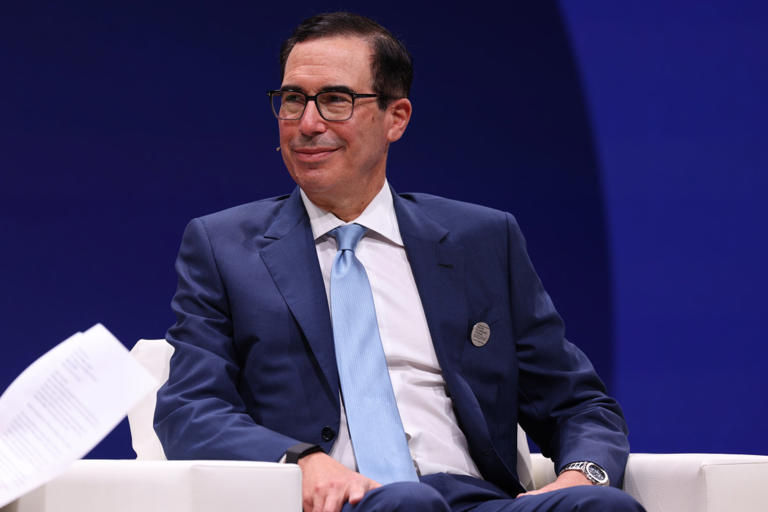Shares of New York Community Bank (NYCB) surged on Thursday following news of a $1 billion rescue led by former Treasury Secretary Steven Mnuchin and his firm, Liberty Strategic Capital.
The regional bank’s stock soared by as much as 16% to $4.02 during Thursday’s trading session, rebounding from a more than 40% decline in the previous session. The sharp decline occurred after reports surfaced in The Wall Street Journal indicating that the company was seeking to raise new capital to bolster its balance sheet. NYCB had previously shocked investors on January 31 by announcing an unexpected fourth-quarter loss, resulting in the stock plummeting to its lowest level since 1997.
NYCB deposits outflow, then ‘strong again’
According to a report by CNN on Thursday, citing information from an investor conference call earlier that day, customers withdrew $6 billion in deposits from New York Community Bank (NYCB) between February 5 and March 5. This resulted in the bank’s deposit base decreasing by 7% to $77 billion.
Prior to the bank’s disclosure last week regarding the identification of “material weakness” in its controls, there were no significant changes in its deposit levels. Sandro DiNello, who assumed the role of chief executive at the end of February, acknowledged that Friday was a challenging day for the bank. However, he noted that deposits rebounded over the weekend and remained strong on Monday and Tuesday.
NYCB cuts dividend second time this year
New York Community Bank (NYCB) is taking significant measures to address its financial challenges. The bank has announced a second reduction in its quarterly dividend this year, cutting it to 1 cent per share from 5 cents, representing an 80% decrease. Additionally, both Moody’s Investors Service and Fitch Ratings recently downgraded NYCB to junk status.
Former Treasury Secretary Steven Mnuchin, along with an investor group, has intervened by making a substantial investment in the bank. Mnuchin expressed confidence in NYCB’s CEO, Sandro DiNello, and the new management team, stating that they have taken necessary steps to stabilize the company and position it for long-term profitability. As part of the investment plan, Mnuchin will join the NYCB board, alongside Joseph Otting, who has been appointed as the new CEO. Otting, a former U.S. comptroller of the currency, has close ties to Mnuchin from their time in the Donald Trump administration.
Mnuchin revealed that he had been considering NYCB for some time, citing concerns about perceived risks in the bank’s loans. However, with the infusion of $1 billion in capital, Mnuchin believes that the bank’s balance sheet will be strengthened, enabling it to address any issues related to loans effectively.
Wedbush analysts have reacted to the news by slashing their price target on NYCB. While acknowledging that the investment provides a much-needed lifeline to the bank, they highlighted its dilutive impact on common shareholders. The $1 billion equity infusion, along with the potential for an additional $600 million based on warrant exercises, is expected to double the number of common shares outstanding. However, Wedbush believes that the investment will improve depositor confidence and reduce the likelihood of NYCB entering FDIC receivership.
Analysts concerned about office properties
Wedbush expressed that the infusion of capital into NYCB should enable the bank to increase its loan-loss reserve to levels deemed more appropriate, particularly considering the ongoing stress in the New York City rent-regulated multifamily and office assets, which collectively account for 26% of the bank’s loans.
With 395 branches across New York, Michigan, New Jersey, Ohio, Florida, Arizona, and Wisconsin, NYCB maintains a significant presence in and around New York City. Notably, the bank has been a major lender to owners and developers of rent-controlled apartments in the area.
Wedbush analysts highlighted concerns regarding the economics of rent-regulated multifamily properties (approximately 22% of total loans) and office properties, particularly in light of challenges such as higher interest rates and the shift to remote work.
The firm further expressed apprehension that loan maturities could place pressure on borrowers who may struggle to secure additional equity for their properties in refinance transactions. This, in turn, could potentially result in negative credit migration or require NYCB to offer concessions, such as extending loan maturities at below-market rates.
In addition to Steven Mnuchin, the investor group participating in the bailout includes Hudson Bay Capital, Reverence Capital Partners, Citadel Global Equities (a division of the Citadel hedge fund), and others.
